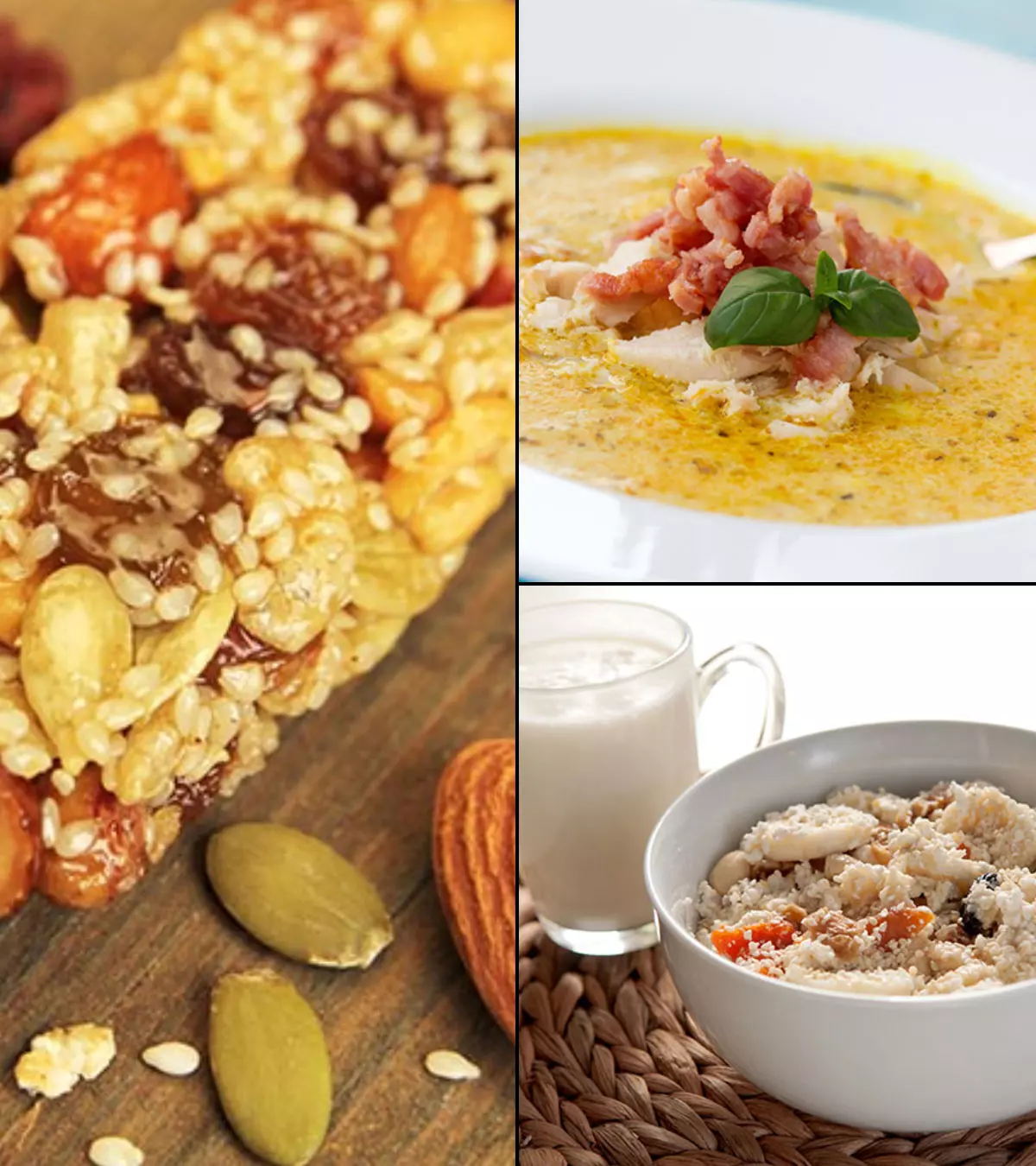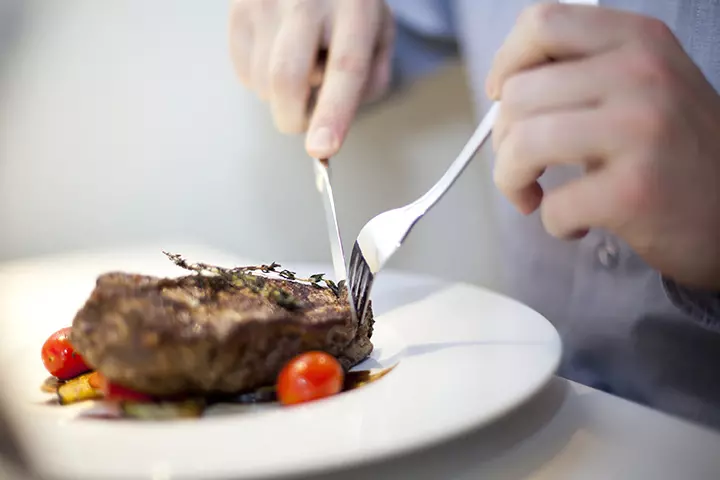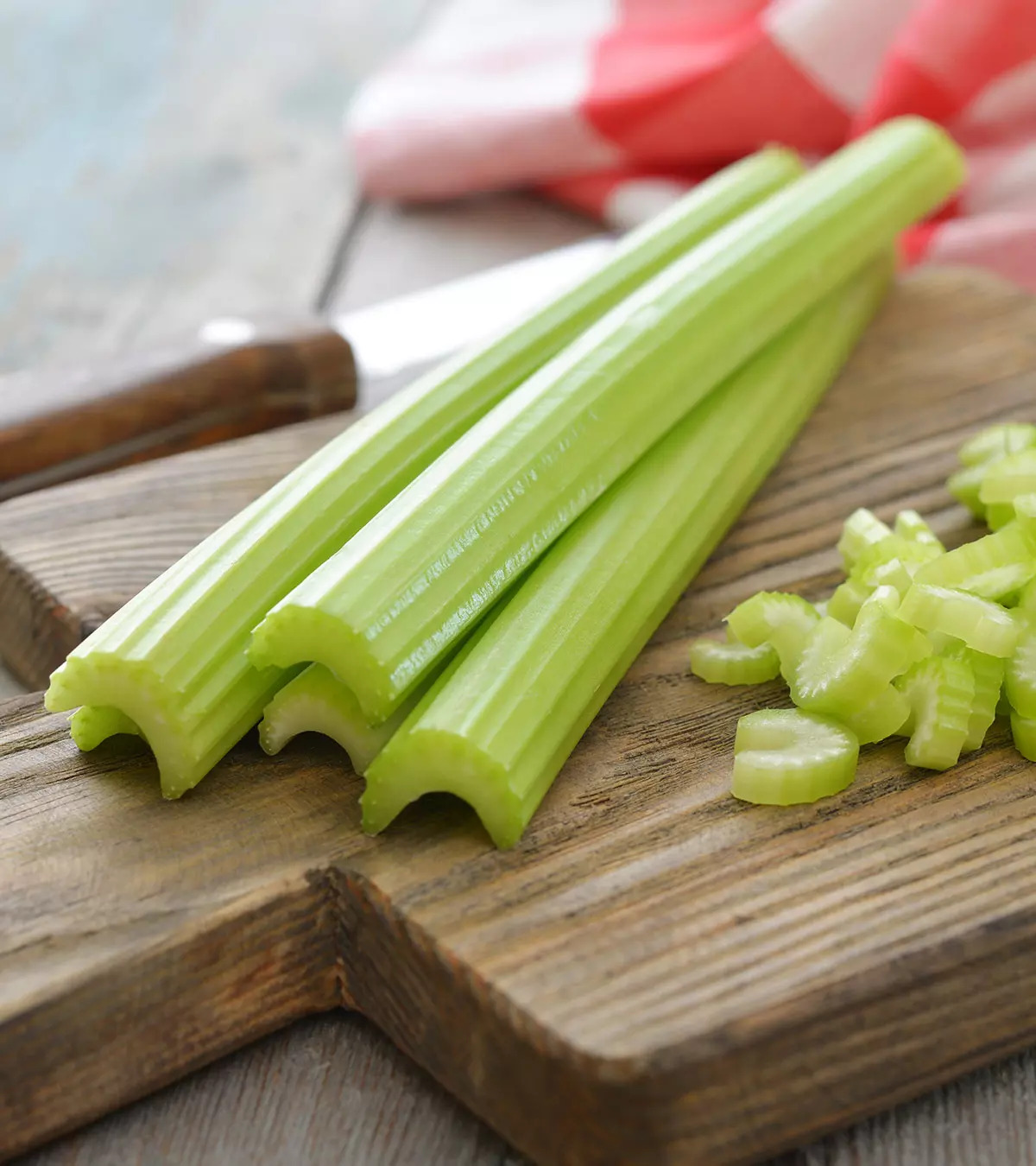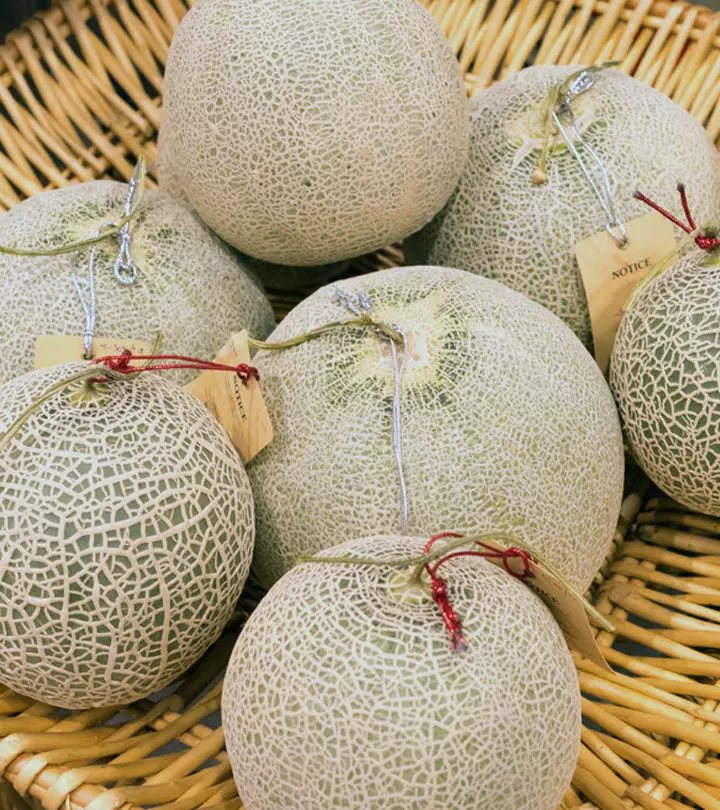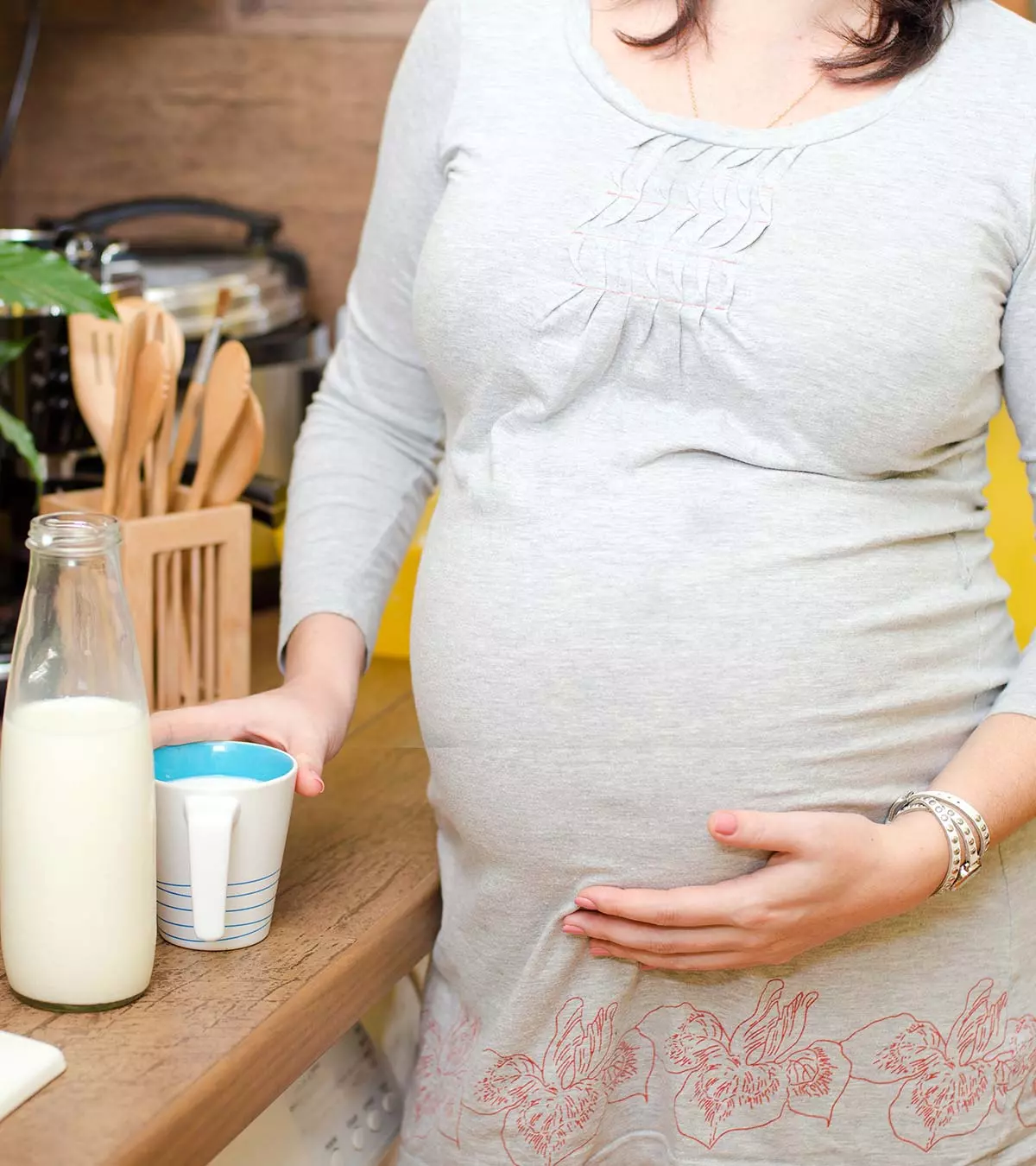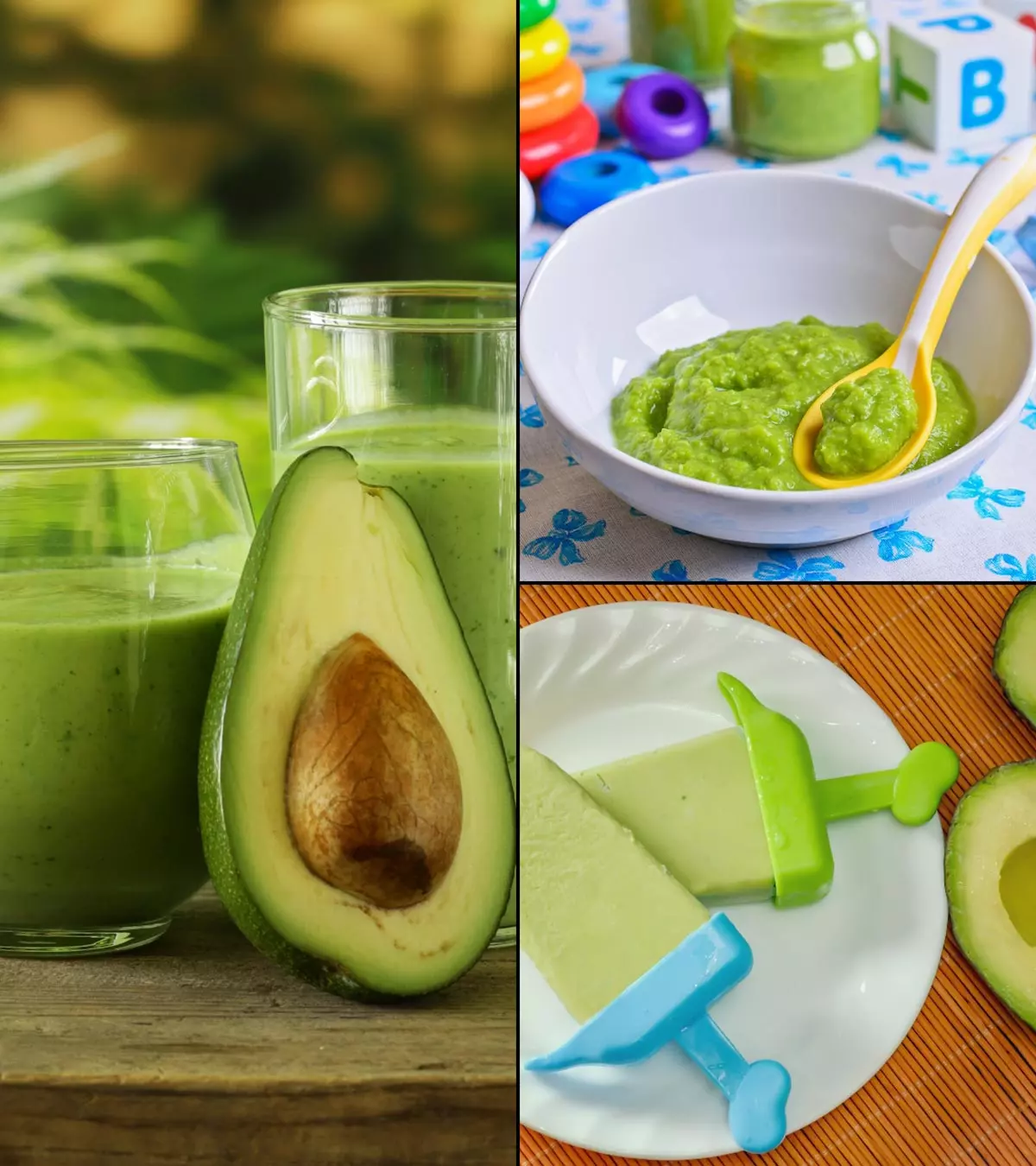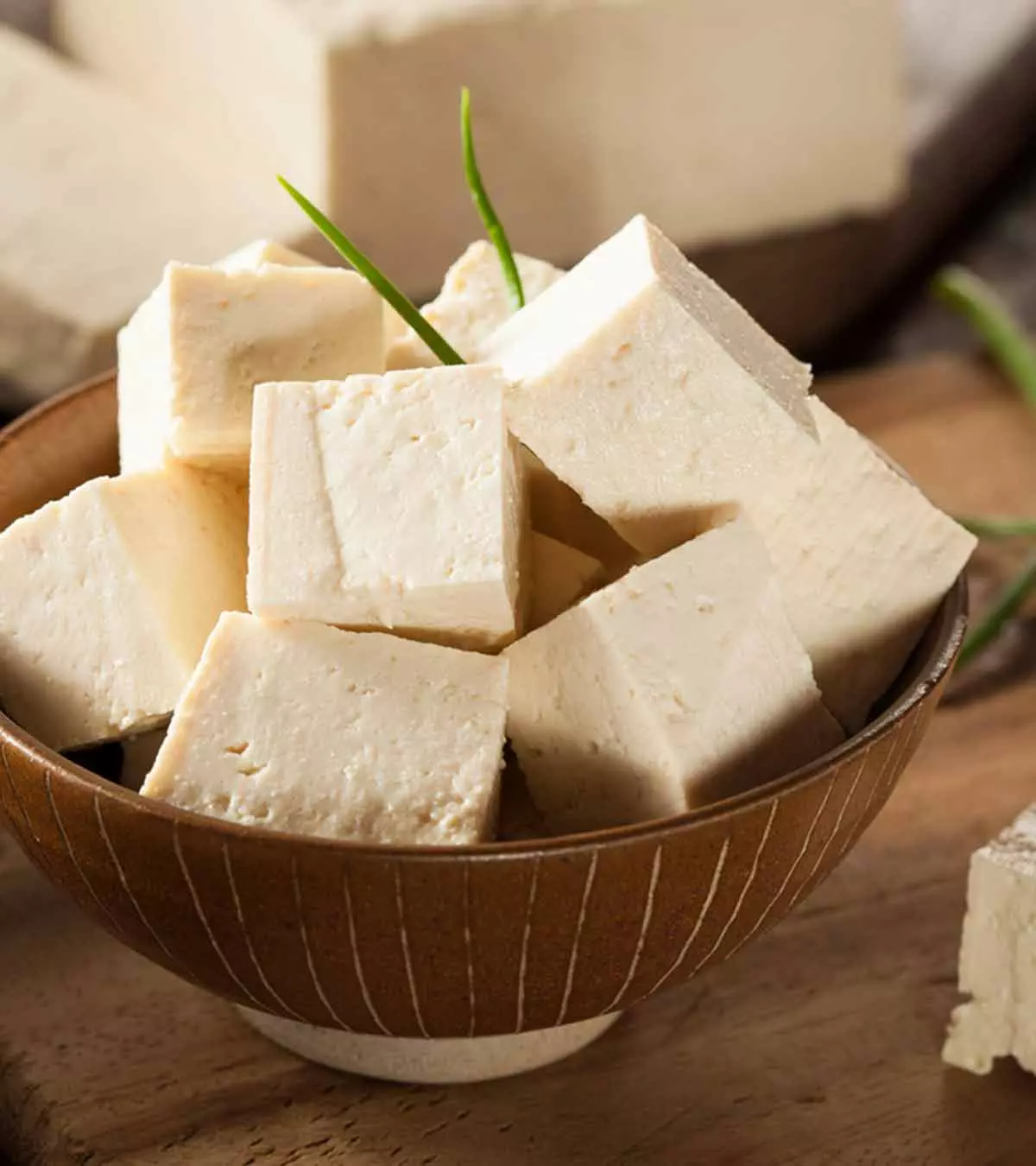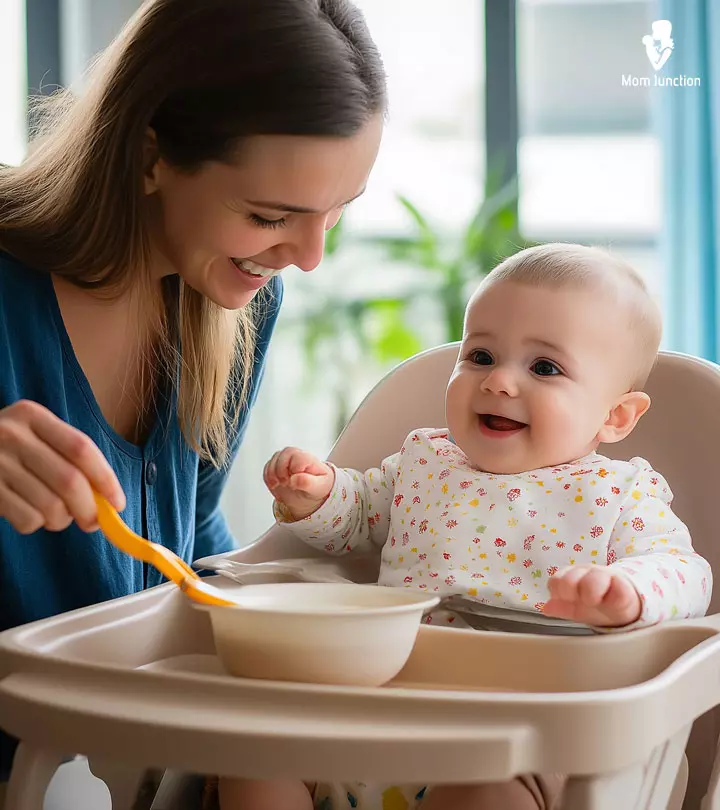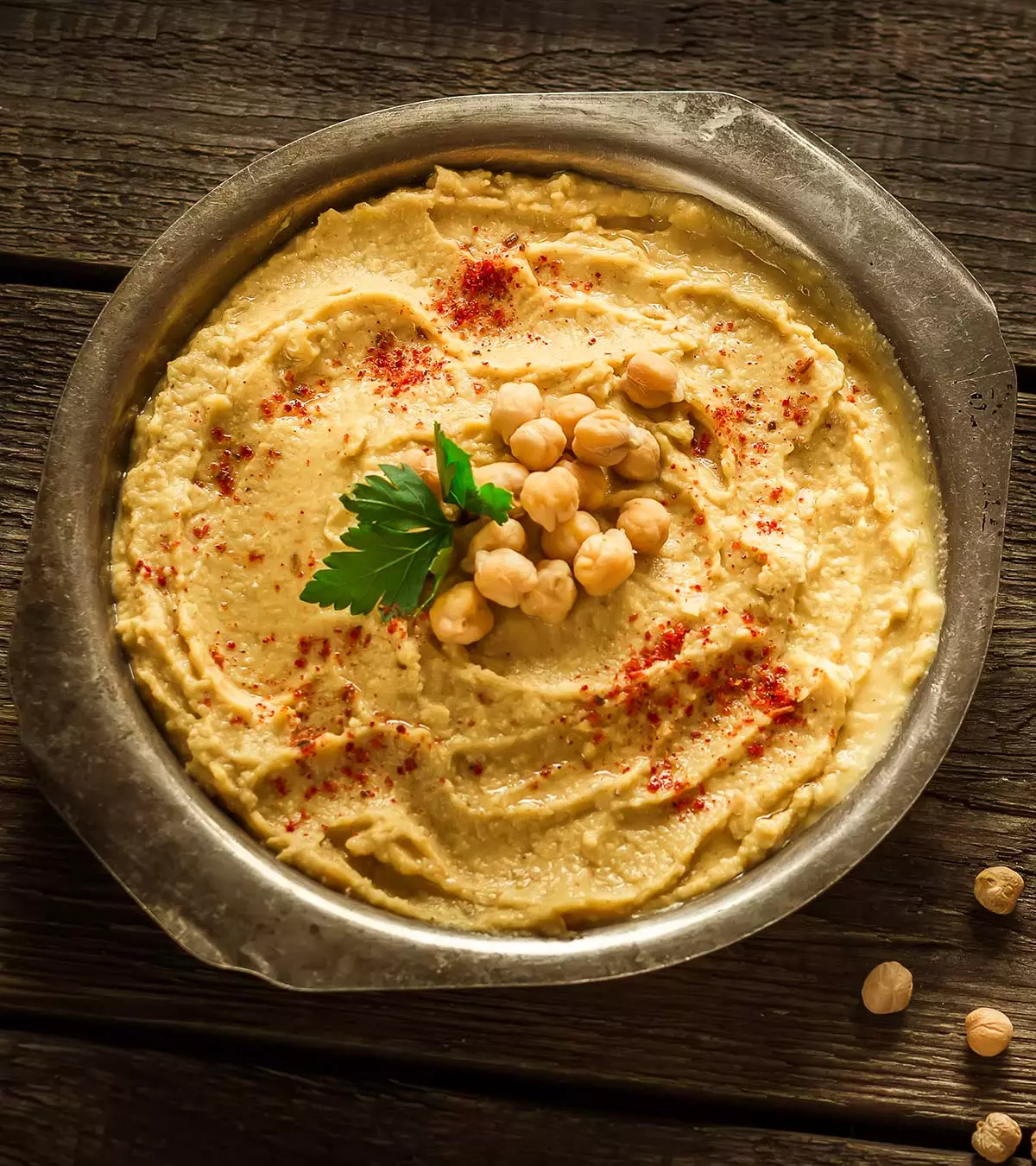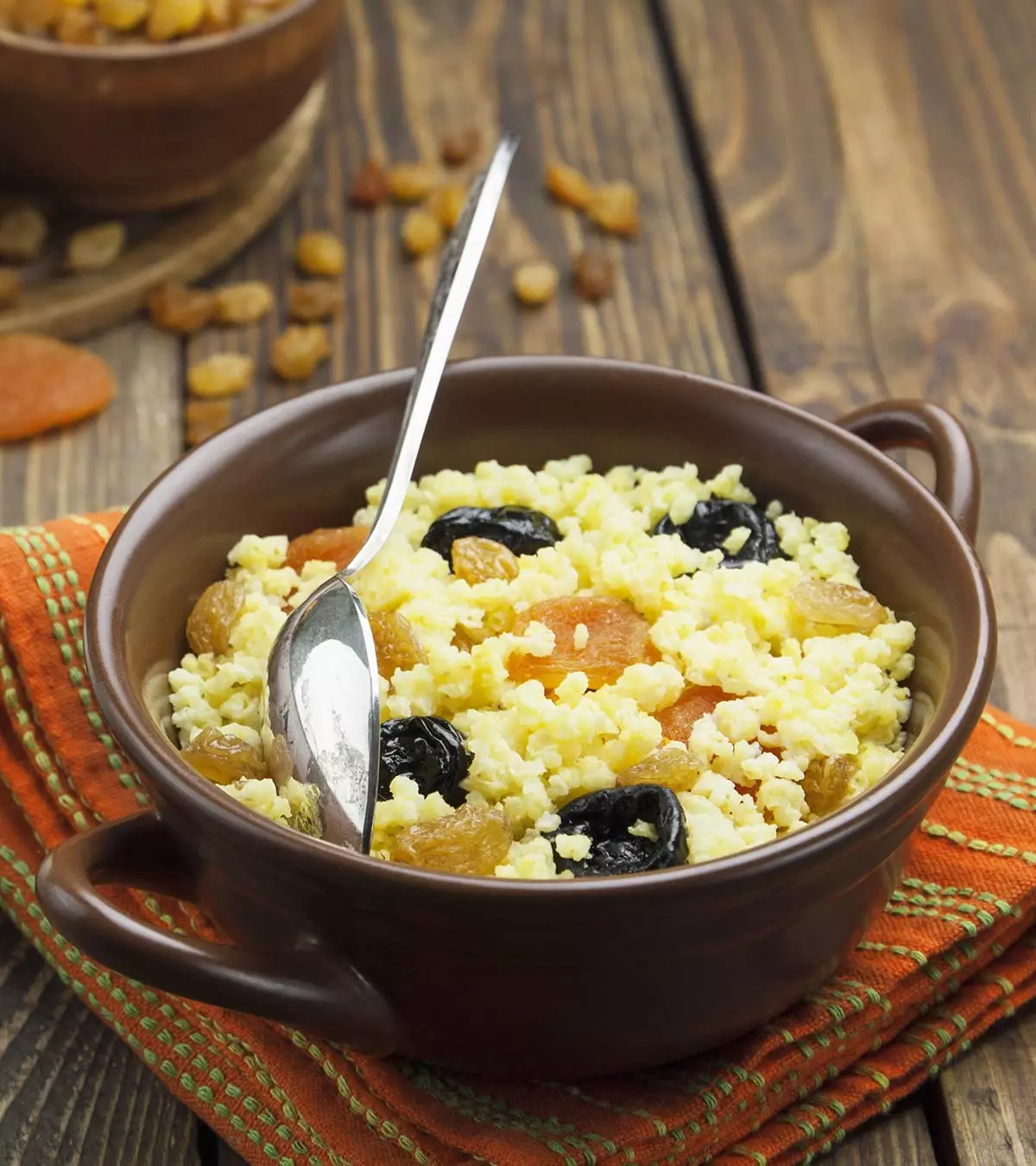
Image: iStock
If you crave kiwifruit during pregnancy, learning about its safety is essential before including this “nutritional powerhouse” in your diet. Kiwifruit, also known as Chinese gooseberry, is a juicy fruit loaded with vitamins C and E, folic acid, potassium, trace minerals, and fibers essential for the mother and the developing baby. It is also rich in antioxidants that can have several health-promoting effects. This sweet and unique tasting fruit is native to China and New Zealand and is available all around the year.
One can consume kiwifruit as a whole or can make its juice. You can also use it to make fruit salads or toppings on cakes. Read on to learn more about the safety of consumption of kiwi in pregnancy, its possible health benefits, and how much kiwi is safe to eat during pregnancy.
Key Pointers
- Kiwis are rich in essential nutrients such as vitamin C and E, folic acid, calcium, potassium, and fiber.
- Kiwi has high amounts of antioxidants which help to reduce fatigue and improve brain and bone health.
- Kiwi can also help with wound healing, alleviate constipation, boost immunity, manage blood sugar levels, and prevent anemia.
- The fruit can be consumed in various forms, including popsicles, smoothies, and fruit salads.
- However, some women may experience side effects after consuming kiwi, such as asthma, rashes, diarrhea, nausea, and vomiting.
Is Kiwifruit Safe To Eat During Pregnancy?
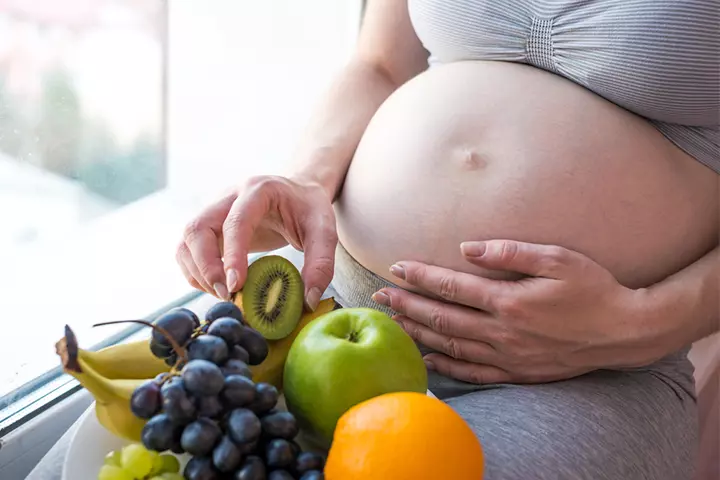
You can eat kiwi during pregnancy, as it is high in vitamin C and K. It is also rich in folate that aids in the development of the brain and cognitive abilities, and has shown positive results in the development process of the fetus. Including the fruit both before and during pregnancy might help prevent neural tube defectsiBirth defects of the central nervous system that occur during fetal development in babies (1) (2).
Nutritional Profile Of Kiwi
The fruit has tropical flavor, has no cholesterol, and is low in sugars and fats. It contains vitamins C, K, and E, folate, potassium, dietary fiber, choline, copper, magnesium, and phosphorus.
According to the USDA (United States Department of Agriculture), one medium-sized fruit i.e., about 69g provides 42.1 calories, 0.3g fat, 10g carbohydrates, 2g dietary fiber, 64mg vitamin C, 17.2mcg folate and 27.8mcg vitamin K. Kiwi seeds contain alpha-linolenic acid, omega-3 fatty acids, and the pulp contains carotenoids, including provitamin A, beta carotene, lutein and zeaxanthin (3).
The fruit is beneficial provided you have it in limited amounts.
Blanca Garcia, a registered dietitian nutritionist from Los Angeles, California, says, “Satisfy your pregnancy sweet and sour cravings by getting those kiwis that are slightly firm, blemish-free, and fragrant. Kiwi is a powerhouse of nutrients that is essential for every pregnant woman. It is versatile too. All you have to do is be creative and enjoy it in several ways. When I was pregnant, I remember mixing it with guacamole. Unexpectedly, the result was satisfying. Its tanginess perfectly blends and balances the creaminess of avocados.”
 Nutrition fact
Nutrition factBenefits Of Kiwi During Pregnancy
“Kiwis are low in sugar, with just approximately 6.7g per piece. It means that the risk of raising your blood glucose, developing gestational diabetes, or getting unwanted weight gain is unlikely. Thus, it’s a safe addition to a pregnant woman’s meal. Furthermore, it is rich in vitamin C and fiber, which boosts the immune system and regulates bowel movement,”
Garcia opines.
In addition to the folic acid benefits that kiwi offers, it has other prenatal nutrition benefits too. Here are a few of them:
- Helps digestion: Dietary fiber in the fruit can help soften the stool and cause smooth bowel movements. It also prevents constipation, relieves bloating, and abdominal pain (4).
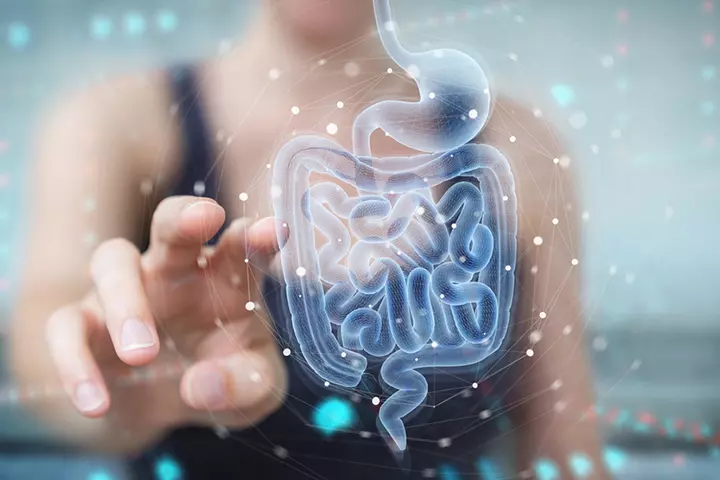
 Quick fact
Quick fact- Boosts immune system and energy: Kiwi has a high quantity of vitamin C that helps improve immunity and offers protection from free radicalsiHighly unstable and harmful molecules capable of causing cell damage and allergies. It also increases energy levels and alleviates fatigue (5). It also has a high quantity of vitamin C that helps improve immunity and protect from free radical damage and allergies.
The following chart presents a comparative evaluation of the levels of vitamin C found in Kiwi as compared to other commonly consumed fruits. According to the data, Kiwi contains about 161.3 mg of vitamin C per 100 g, nearly three times more than the amount of vitamin C present in oranges and strawberries.

Vitamin C content in kiwifruit vs.other common fruits
Source: The nutritional and health attributes of kiwifruit- Stimulates neurotransmitters: Vitamin C in kiwi helps in the formation of neurotransmittersiChemicals that carry nerve signals and facilitate communication between neurons (nerve cells) that are important in improving brain function (6).
- Manages blood sugar levels: Kiwi is a low glycemic indexiA rating system that helps determine how specific foods containing carbohydrates increase the blood sugar levels (GI) fruit and is a good choice if you have gestational diabetes. As 100g of kiwi contains just about 5g or one teaspoon of glucose, it does not lead to an increase in sugars and keeps diabetes under control (7).
- Repairs wounds and improves bone health: The vitamin K helps the blood clot normally (8). It fastens up the healing power of the body and is also essential for bone development (9).
- Prevents anemia: The developing baby requires extra iron that could increase the risk of anemia in the mother. Vitamin C facilitates better absorption of iron from iron-rich foods (10).
Kiwifruit is one of the most nutrient-rich foods, which means that you can include it in your everyday menu without worry. Considered one of the best fruits to eat during pregnancy, kiwifruit provides essential vitamins and minerals. However, like all good things, it’s important to enjoy it in moderation.
How Much Kiwi Is Safe To Eat When Pregnant?
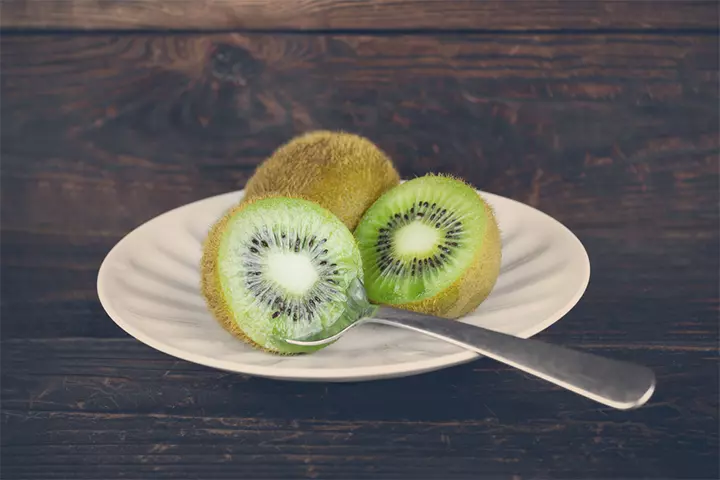
You can have two kiwifruits (one serving of fruits) every day for a safe and healthy pregnancy (11). If you develop any allergic symptoms or digestive problems, you should stop eating it as it can have a negative impact on your health.
Side Effects Of Kiwi
You may develop allergic symptoms or other health issues only when you take the fruit excessively. The possible side effects could be:
- Asthma, rashes, hives, and latex allergies (12)
- Sores and rashes in the mouth or tongue from unripe kiwifruit
- Gastrointestinal issues like diarrhea, nausea, and vomiting

In any of these above cases, stop eating the fruit for a few days.
 Point to consider
Point to considerIs It Safe To Eat Unripe Kiwifruit During Pregnancy?
Unripe kiwis are more acidic than the ripened ones, and if you overeat them, they may cause sores in the mouth or tongue. To avoid this problem, you may have them with custard or yogurt.
Ways To Include Kiwi In Your Pregnancy Diet
You can eat the fruit as it is as it tastes sweet and juicy. A few other ways to include kiwi in your diet are:
- Add chopped fruit to salads, yogurt or custard
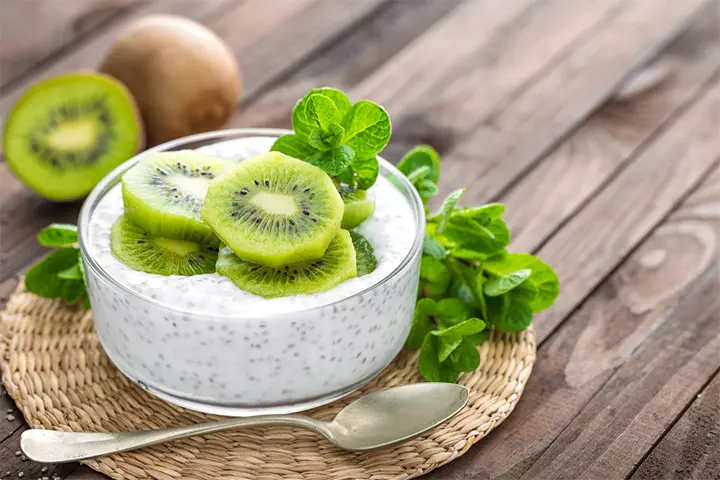
Frequently Asked Questions
1. Does craving kiwi during pregnancy indicate a boy or girl?
Although you might have heard from various sources that craving something sweet or tart (like kiwi fruit) may indicate you could be carrying a girl, there is no scientific evidence relating to cravings and baby gender (13).
2. Is Kiwi Crush safe during pregnancy?
Yes, you may occasionally relish a Kiwi Crush during pregnancy; however, when refrigerated and thawed, consume it within two to three days to retain its freshness.
3. When should I not eat kiwi?
Pregnant women with a history of birch pollen-associated food allergy must avoid consuming the fruit (14).
Kiwifruits are rich in vitamin C, K, folate, and fiber. They might help fetal brain development and reduce the risk of neural defects in babies. Eating kiwifruit during pregnancy adds to better digestion, boosts immunity, and controls blood sugar levels in women. In some cases, kiwifruits may give rise to allergic reactions, such as asthma, rashes, and diarrhea. Eating raw kiwifruit in excess may also give you sores in the mouth. Therefore, remember to enjoy this fruit in moderation. Add it to your pregnancy diet in salads, smoothies, or jams. If you experience any side effects, stop eating them and consult a doctor.
Infographic: How To Include Kiwi In The Pregnancy Diet?
Kiwi is a juicy tropical fruit known as the “nutritional powerhouse.” You can include it in your diet if you’re pregnant, but you must do it in moderation. So, look at the infographic below to learn some delightful ways to use kiwi and savor its taste while reaping its health benefits. Illustration: Momjunction Design Team
Illustration: Amazing Benefits Of Kiwifruit During Pregnancy
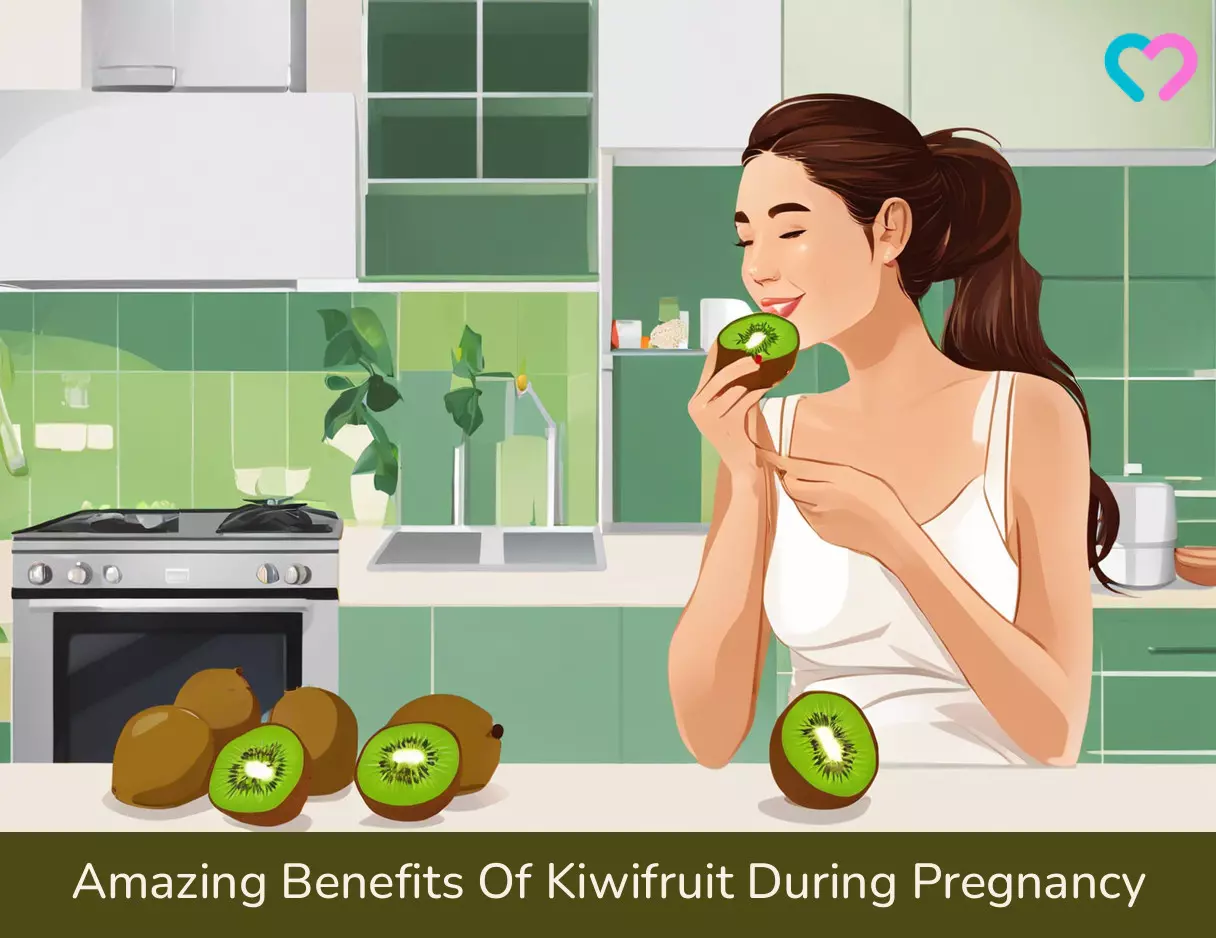
Image: Stable Diffusion/MomJunction Design Team
References
1. Al Mannai Lolowa et al.; Knowledge and intake of folic acid among teachers of childbearing age in the State of Qatar: a cross-sectional study; BMJ Open (2019)
2. Neural Tube Defects; Centers for Disease Control and Prevention
3. Kiwifruit, green, raw; Basic Report; USDA
4. Sun Hwan Bae; Diets for constipation; Pediatr Gastroenterol Hepatol Nutr (2014)
5. David P. Richardson et al.; The nutritional and health attributes of kiwifruit: A review; Eur J Nutr (2018)
6. Matteo Briguglio et al.; Dietary neurotransmitters: A narrative review on current knowledge; Nutrients (2018)
7. Monro JA; Kiwifruit, carbohydrate availability, and the glycemic response; Adv Food Nutr Res (2013)
8. Vitamin K; Clemson University (2007)
9. Naoko Tsugawa, Masataka Shiraki;Vitamin K Nutrition and Bone Health; Nutrients (2020)
10. Iron for pregnant women; Queensland Health
11. Healthy eating during pregnancy and breastfeeding; Family Health Service – Department of Health (2018)
12. Allergenic foods and their allergens, with links to informall; University of Nebraska-Lincoln (2014)
13. Kiwifruit and gut health; Pharmacy Today
14. H Gall et al.; Kiwi fruit allergy: a new birch pollen-associated food allergy; NCBI (1994).
Community Experiences
Join the conversation and become a part of our nurturing community! Share your stories, experiences, and insights to connect with fellow parents.
Read full bio of Dr. Shikha Sharma
- Blanca Garcia has been a registered dietitian nutritionist since 2013 with a private practice in Pasadena, California. She currently consults through the preschool Head Start Programs in Los Angeles. Blanca graduated in 2011 from California State University of Los Angeles and interned at the University of Puerto Rico Medical Science campus in 2012.
 Blanca Garcia has been a registered dietitian nutritionist since 2013 with a private practice in Pasadena, California. She currently consults through the preschool Head Start Programs in Los Angeles. Blanca graduated in 2011 from California State University of Los Angeles and interned at the University of Puerto Rico Medical Science campus in 2012.
Blanca Garcia has been a registered dietitian nutritionist since 2013 with a private practice in Pasadena, California. She currently consults through the preschool Head Start Programs in Los Angeles. Blanca graduated in 2011 from California State University of Los Angeles and interned at the University of Puerto Rico Medical Science campus in 2012.
Read full bio of Swati Patwal
Read full bio of Rebecca Malachi
Read full bio of Aneesha Amonz








